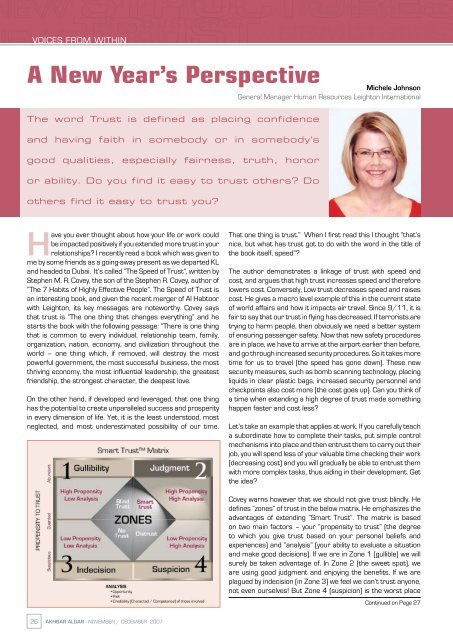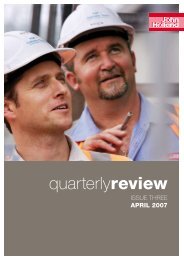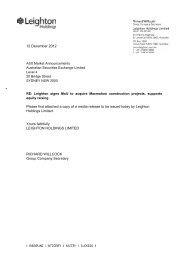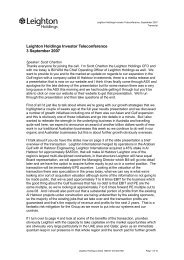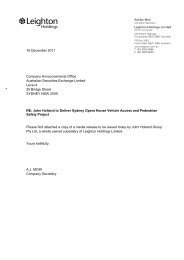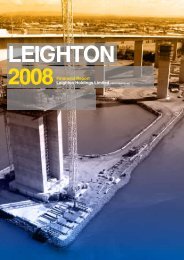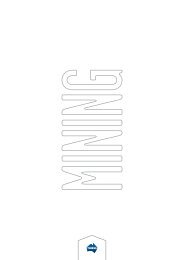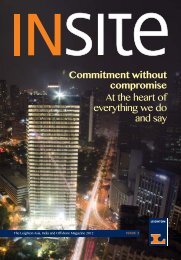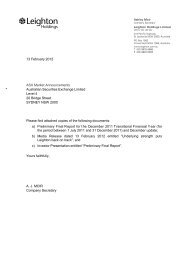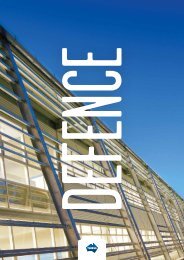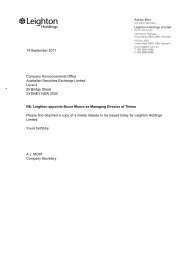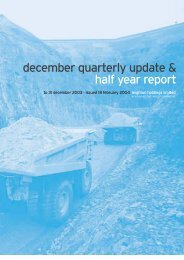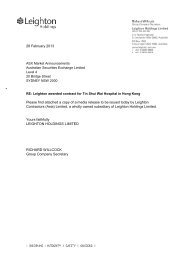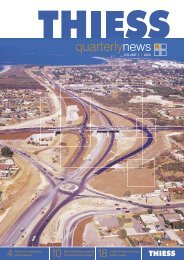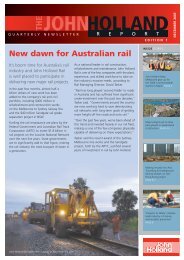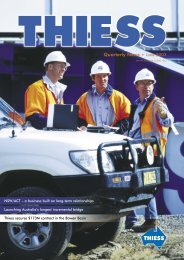THE NEWS OF AL HABTOOR LEIGHTON GROUP Dubai - UAE ...
THE NEWS OF AL HABTOOR LEIGHTON GROUP Dubai - UAE ...
THE NEWS OF AL HABTOOR LEIGHTON GROUP Dubai - UAE ...
You also want an ePaper? Increase the reach of your titles
YUMPU automatically turns print PDFs into web optimized ePapers that Google loves.
NEW Perspecti<br />
VOICES FROM WITHIN<br />
A New Year’s Perspective<br />
Michele Johnson<br />
General Manager Human Resources Leighton International<br />
The word Trust is defined as placing confidence<br />
and having faith in somebody or in somebody’s<br />
good qualities, especially fairness, truth, honor<br />
or ability. Do you find it easy to trust others? Do<br />
others find it easy to trust you?<br />
Have you ever thought about how your life or work could<br />
be impacted positively if you extended more trust in your<br />
relationships? I recently read a book which was given to<br />
me by some friends as a going-away present as we departed KL<br />
and headed to <strong>Dubai</strong>. It’s called “The Speed of Trust”, written by<br />
Stephen M. R. Covey, the son of the Stephen R. Covey, author of<br />
“The 7 Habits of Highly Effective People”. The Speed of Trust is<br />
an interesting book, and given the recent merger of Al Habtoor<br />
with Leighton, its key messages are noteworthy. Covey says<br />
that trust is “The one thing that changes everything” and he<br />
starts the book with the following passage: “There is one thing<br />
that is common to every individual, relationship team, family,<br />
organization, nation, economy, and civilization throughout the<br />
world – one thing which, if removed, will destroy the most<br />
powerful government, the most successful business, the most<br />
thriving economy, the most influential leadership, the greatest<br />
friendship, the strongest character, the deepest love.<br />
On the other hand, if developed and leveraged, that one thing<br />
has the potential to create unparalleled success and prosperity<br />
in every dimension of life. Yet, it is the least understood, most<br />
neglected, and most underestimated possibility of our time.<br />
That one thing is trust.” When I first read this I thought “that’s<br />
nice, but what has trust got to do with the word in the title of<br />
the book itself, speed”?<br />
The author demonstrates a linkage of trust with speed and<br />
cost, and argues that high trust increases speed and therefore<br />
lowers cost. Conversely, Low trust decreases speed and raises<br />
cost. He gives a macro level example of this in the current state<br />
of world affairs and how it impacts air travel. Since 9/11, it is<br />
fair to say that our trust in flying has decreased. If terrorists are<br />
trying to harm people, then obviously we need a better system<br />
of ensuring passenger safety. Now that new safety procedures<br />
are in place, we have to arrive at the airport earlier than before,<br />
and go through increased security procedures. So it takes more<br />
time for us to travel (the speed has gone down). These new<br />
security measures, such as bomb scanning technology, placing<br />
liquids in clear plastic bags, increased security personnel and<br />
checkpoints also cost more (the cost goes up). Can you think of<br />
a time when extending a high degree of trust made something<br />
happen faster and cost less?<br />
Let’s take an example that applies at work. If you carefully teach<br />
a subordinate how to complete their tasks, put simple control<br />
mechanisms into place and then entrust them to carry out their<br />
job, you will spend less of your valuable time checking their work<br />
(decreasing cost) and you will gradually be able to entrust them<br />
with more complex tasks, thus aiding in their development. Get<br />
the idea?<br />
Covey warns however that we should not give trust blindly. He<br />
defines “zones” of trust in the below matrix. He emphasizes the<br />
advantages of extending “Smart Trust”. The matrix is based<br />
on two main factors – your “propensity to trust” (the degree<br />
to which you give trust based on your personal beliefs and<br />
experiences) and “analysis” (your ability to evaluate a situation<br />
and make good decisions). If we are in Zone 1 (gullible) we will<br />
surely be taken advantage of. In Zone 2 (the sweet spot), we<br />
are using good judgment and enjoying the benefits. If we are<br />
plagued by indecision (in Zone 3) we feel we can’t trust anyone,<br />
not even ourselves! But Zone 4 (suspicion) is the worst place<br />
Continued on Page 27<br />
26 AKHBAR <strong>AL</strong>DAR - NOVEMBER / DECEMBER 2007


